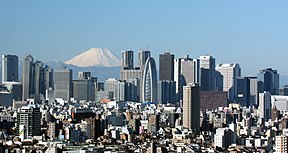
Back Токио Abkhazian Tokyô ACE Токио ADY Tokio Afrikaans Tokio ALS ቶክዮ Amharic Tokio AN Geddoburg ANG टोक्यो ANP طوكيو Arabic
Tokyo
東京都 | |
|---|---|
| Tokyo Metropolis | |
| Nicknames: | |
| Anthem: "Tokyo Metropolitan Song" (東京都歌, Tōkyō-to Ka) | |
 Interactive map outlining Tokyo | |
 Location within Japan | |
| Coordinates: 35°41′N 139°46′E / 35.683°N 139.767°E | |
| Country | |
| Region | Kantō |
| Island | Honshu |
| Capital | Tokyo (de facto; de jure: Shinjuku)[2] |
| Divisions | 23 special wards, 26 cities, 1 district, and 4 subprefectures |
| Government | |
| • Body | Tokyo Metropolitan Government |
| • Governor | Yuriko Koike (indp.) |
| • Representatives | 42 |
| • Councilors | 11 |
| Area | |
• Total | 2,194 km2 (847 sq mi) |
| • Metro | 13,452 km2 (5,194 sq mi) |
| • Rank | 45th in Japan |
| Highest elevation | 2,017 m (6,617 ft) |
| Lowest elevation | 0 m (0 ft) |
| Population (2024)[5] | |
• Total | 14,187,176 |
| • Rank | 1st in Japan |
| • Density | 6,363/km2 (16,480/sq mi) |
| • Urban | 39,105,000 |
| • Metro | 41,000,000 |
| • Metro density | 3,000/km2 (7,900/sq mi) |
| • Dialects | |
| Demonym | Tokyoite |
| GDP[7] | |
| • Total | JP¥109.692 trillion (US$1.027 trillion) (2020) |
| • Metro | JP¥222.129 trillion (US$2.084 trillion) (2020) |
| Time zone | UTC+09:00 (Japan Standard Time) |
| ISO 3166-2 | JP-13 |
| Flower | Yoshino cherry |
| Tree | Ginkgo |
| Bird | Black-headed gull |
| Website | metro.tokyo.lg.jp |
Tokyo,[a] officially the Tokyo Metropolis,[b] is the capital city of Japan. With a population of over 14 million residents within the city proper as of 2023, it is one of the most populous cities in the world. The Greater Tokyo Area, which includes Tokyo and parts of six neighboring prefectures, is the most-populous metropolitan area in the world, with 41 million residents as of 2024[update].
Located at the head of Tokyo Bay, Tokyo is part of the Kantō region on the central coast of Honshu, Japan's largest island. Tokyo serves as Japan's economic center and the seat of both the Japanese government and the Emperor of Japan. The Tokyo Metropolitan Government administers Tokyo's central 23 special wards (which formerly made up Tokyo City), various commuter towns and suburbs in its western area, and two outlying island chains known as the Tokyo Islands. Despite most of the world recognizing Tokyo as a city, since 1943 its governing structure has been more akin to a prefecture, with an accompanying Governor and Assembly taking precedence over the smaller municipal governments which make up the metropolis. Notable special wards in Tokyo include Chiyoda, the site of the National Diet Building and the Tokyo Imperial Palace; Shinjuku, the city's administrative center; and Shibuya, a commercial, cultural, and business hub in the city.
Before the 17th century, Tokyo, then known as Edo, was mainly a fishing village. It gained political prominence in 1603 when it became the seat of the Tokugawa shogunate. By the mid-18th century, Edo was among the world's largest cities, with over a million residents. Following the Meiji Restoration in 1868, the imperial capital in Kyoto was moved to Edo, and the city was renamed Tokyo (lit. 'Eastern Capital'). In 1923, Tokyo was damaged substantially by the Great Kantō earthquake, and the city was later badly damaged by allied bombing raids during World War II. Beginning in the late 1940s, Tokyo underwent rapid reconstruction and expansion that contributed to the era's so-called Japanese economic miracle in which Japan's economy propelled to the second-largest in the world at the time behind that of the United States.[9] As of 2023[update], the city is home to 29 of the world's 500 largest companies, as listed in the annual Fortune Global 500; the second-highest number of any city.[10]
In the 20th and 21st centuries, Tokyo became the first city in Asia to host the Summer Olympics and Paralympics in 1964, and again in 2021, and it also hosted three G7 summits in 1979, 1986, and 1993. Tokyo is an international research and development hub and an academic center with several major universities, including the University of Tokyo, the top-ranking university in the country.[11][12] Tokyo Station is the central hub for the Shinkansen, Japan's high-speed railway network, and Shinjuku Station in Tokyo is the world's busiest train station. The city is home to the world's tallest tower, Tokyo Skytree.[13] The Tokyo Metro Ginza Line, which opened in 1927, is the oldest underground metro line in Asia–Pacific.[14]
Tokyo's nominal gross domestic output was 113.7 trillion yen or US$1.04 trillion in FY2021 and accounted for 20.7% of the country's total economic output, which converts to 8.07 million yen or US$73,820 per capita.[15] Including the Greater Tokyo Area, Tokyo is the second-largest metropolitan economy in the world after New York, with a 2022 gross metropolitan product estimated at US$2.08 trillion.[16] Although Tokyo's status as a leading global financial hub has diminished with the Lost Decades since the 1990s—when the Tokyo Stock Exchange (TSE) was the world's largest, with a market capitalization about 1.5 times that of the NYSE[17]—the city is still a large financial hub, and the TSE remains among the world's top five major stock exchanges.[18] Tokyo is categorized as an Alpha+ city by the Globalization and World Cities Research Network. The city is also recognized as one of the world's most livable ones; it was ranked fourth in the world in the 2021 edition of the Global Livability Ranking.[19] Tokyo has also been ranked as the safest city in the world in multiple international surveys.[20][21][22][23][24]
- ^ "Japan opens up to foreign direct investors". February 12, 2018. Archived from the original on February 16, 2024. Retrieved February 16, 2024.
- ^ 東京都の県庁(都庁)所在地について ("On the seat of the prefectural government (Metropolitan government) of Tokyo Metropolis"). Tokyo Metropolitan Government. Archived from the original on February 12, 2024. Retrieved May 11, 2024. The special ward of Shinjuku is the seat of the Tokyo Metropolitan Government. Tokyo as defined in this articles is a prefecture, not a municipality, Tokyo's special wards, cities, towns and villages are Tokyo's municipalities. As the informal prefectural capital of Tokyo, "Tokyo" means the 23 special wards of Tokyo, i.e. former Tokyo City, not Tokyo, the entire prefecture/"Metropolis" as defined in this article.
- ^ "Reiwa 1 nationwide prefectures, cities and towns area statistics (October 1)" (in Japanese). Geospatial Information Authority of Japan. December 26, 2019. Archived from the original on April 15, 2020. Retrieved April 28, 2020.
- ^ "Mountains of Tokyo Metropolis" (in Japanese). Geospatial Information Authority of Japan. Retrieved April 28, 2020.
- ^ "東京都の人口(推計)とは" [Population of Tokyo(estimate)]. www.toukei.metro.tokyo.lg.jp (in Japanese). Archived from the original on June 9, 2023. Retrieved September 10, 2024.
- ^ "Major Agglomerations of the World". Population Statistics and Maps. February 28, 2023. Archived from the original on July 7, 2023. Retrieved September 10, 2024.
- ^ "県民経済計算(平成23年度 - 令和2年度)(2008SNA、平成27年基準計数)<47都道府県、4政令指定都市分>". esri.cao.go.jp. Archived from the original on January 23, 2024. Retrieved October 8, 2023.
- ^ "Tokyo". Dictionary.com Unabridged (Online). n.d. Retrieved January 7, 2022.
- ^ "External Economic Relations: From Recovery to Prosperity to Making a Positive Contribution". www.mofa.go.jp. Retrieved July 15, 2023.
- ^ "Major European capital slips out of Fortune Global 500's top 5 cities for the first time in 5 years". Fortune. Archived from the original on August 9, 2023. Retrieved August 8, 2023.
- ^ "QS World University Rankings 2024". Top Universities. Archived from the original on January 4, 2024. Retrieved February 11, 2024.
- ^ "World University Rankings". Times Higher Education (THE). September 25, 2023. Archived from the original on September 27, 2023. Retrieved February 11, 2024.
- ^ "Tokyo – GoJapanGo". Tokyo Attractions – Japanese Lifestyle. Mi Marketing Pty Ltd. Archived from the original on April 26, 2012. Retrieved April 18, 2012.
- ^ Cite error: The named reference
90th-2017was invoked but never defined (see the help page). - ^ "都民経済計算(都内総生産等)令和3年度年報|東京都". www.metro.tokyo.lg.jp. Archived from the original on April 28, 2024. Retrieved April 28, 2024.
- ^ "県民経済計算(平成23年度 - 令和2年度)(2008SNA、平成27年基準計数)<47都道府県、4政令指定都市分> : 経済社会総合研究所 - 内閣府". 内閣府ホームページ (in Japanese). Archived from the original on January 23, 2024. Retrieved February 11, 2024.
- ^ 日本放送協会 (February 22, 2024). "株価史上最高値を記録した35年前「あの頃」どんな時代だった? | NHK". NHKニュース. Archived from the original on April 14, 2024. Retrieved April 28, 2024.
- ^ "The Global Financial Centres Index 35". Long Finance. March 21, 2024. Archived from the original on March 31, 2024. Retrieved March 26, 2024.
- ^ "The Global Liveability Index 2021" (PDF). The Economist. Archived (PDF) from the original on November 6, 2021. Retrieved February 5, 2023.
- ^ "Tokyo is the world's safest city, according to the Economist Intelligence Unit". World Economic Forum. Archived from the original on October 31, 2020. Retrieved October 27, 2020.
- ^ "Here's why Tokyo is the Safest City in the World to Live — PLAZA HOMES". Archived from the original on October 30, 2020. Retrieved October 27, 2020.
- ^ "Tokyo Tops List of Safest Cities in the World, New Report Says". Mental Floss. October 12, 2017. Archived from the original on October 30, 2020. Retrieved October 27, 2020.
- ^ "Tokyo Ranked World's Safest City". Nippon.com. Archived from the original on October 30, 2020. Retrieved October 27, 2020.
- ^ "Tokyo stays on top for third year, with Osaka No. 3 in ranking of world's safest cities". The Japan Times. Archived from the original on October 31, 2020. Retrieved October 27, 2020.
Cite error: There are <ref group=lower-alpha> tags or {{efn}} templates on this page, but the references will not show without a {{reflist|group=lower-alpha}} template or {{notelist}} template (see the help page).










